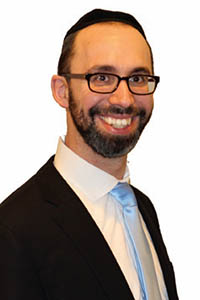
Our sefer/parsha is known as the Book of Names, on the surface because it deals with names: the shevatim (tribes), Moshe Rabbeinu and Hashem. However, we know that the title of a sefer indicates the essence of that book. So, there must be a great deal of significance to “The Book of Names” that would cause the Torah to assign this title. Why does the Torah place so much emphasis on the concept of names?
When my twin daughters were born in 1999, I was living in Yerushalayim. My parents came for Sukkot to help us handle the twins. I was learning in the Mir Yerushalayim Yeshiva and my father accompanied me to meet my rosh yeshiva, Hagaon Rav Nosson Tzvi Finkel. At that time, there were close to 4,000 people studying in the Mir. I introduced my father to Rav Finkel, and my father asked, “There are so many students in the yeshiva—how does the Rosh Yeshiva remember each student’s name?” The Rosh Yeshiva smiled and said, “Each one is precious to me.” We can all relate to feeling precious when someone of great stature remembers our name. Let us examine the depth of a name so we can understand its significance and why it has such meaning to us.
On the sixth day of creation, Adam HaRishon named all the animals. The Midrash tells us that Hashem pointed out to the angels the greatness of Adam HaRishon by showing how Adam had named all the animals, and the Midrash notes that the angels were duly impressed. What was so impressive about this accomplishment, and how did this demonstrate the greatness of Adam? Rav Gedalia Schorr quotes the Maharal, who offers the following explanation. In normal language, a name is just a collection of sounds that the population agrees will be associated with a particular item. In Lashon HaKodesh (Biblical Hebrew), however, the Maharal tells us that a name truly defines the essence of that which it names. In that vein, when Adam named each animal, he was able to discern its very purpose in creation and ascertain its full potential. That was indeed impressive!
Since every word in Hebrew indicates its essence, let us examine the word that means “name”: “shem.” The Gemara in Berachot (7b) quotes a verse in Tehillim (46:9) that says, “Go and see the works of Hashem Who has caused devastations (shamot) in the Land.” The Gemara then says, “Do not pronounce the word as shamot (devastations), but rather shemot (names.)” Since the exchange of the pronunciation of a word to that of a different word can only be done if they are related, what is the connection between shamot (devastations) and shemot (names)? The root of sheimot, shem, (name), means essence, while shamot means desolate, destroyed and lost. When something is gone, it has lost its name, its essence and its purpose and potential in the world. This demonstrates the close connection between the two words. This explanation now gives us insight into the expression used when something is destroyed—“ne’evad shmo,” which means its name has been lost. Indeed, when something is destroyed, it has lost its function, its being.
Our new understanding of the significance of a name illuminates the Midrash in the beginning of our parsha, which tells us “The names of the shevatim were pleasant and their actions were pleasant.” The Midrash is teaching us that the actions of the shevatim fully mirrored their inner purpose. The sons of Yaakov actualized their potential, and their names represented their fulfilled mission.
There is an unusual practice noted in many siddurim, based on the teaching of the Shelah Hakodesh. At the completion of Shemoneh Esrei, these siddurim instruct us to include verses from Tanach that correspond to our names, in case we were to forget our names when coming to Heaven. Why would we forget our names? How does reciting these verses help us remember? I believe, with our new understanding that our names represent our role in life, the insertion of these verses corresponding to our names represent a prayer to Hashem. This is reflected by the phrase “Hashem Tzuri v’Go’ali, Hashem is our Rock and our Redeemer,” which we say immediately after the verses corresponding to our names. The concern is not that we will forget our names, but rather that we might live our life without recognizing the mission and role we were sent to accomplish. This is a scary thought—to approach heaven having forgotten our name/mission in life.
My sincere wish is that the Almighty will help each and every one of us realize the great potential we have in our names/essences, and help us reach our full potential—our purpose in life.
By Rabbi Baruch Bodenheim
Rabbi Baruch Bodenheim is the associate rosh yeshiva of Passaic Torah Institute (PTI)/Yeshiva Ner Boruch. PTI is a yeshiva designed to provide in-depth learning for working men (and their wives!). PTI’s unique approach and dynamic shiurim attract people from all over Northern New Jersey, including Teaneck, Bergenfield, Paramus and Fair Lawn. He initiated and continues to lead a full multi-level Gemara-learning program in the evenings, gives Halacha and hashkafa shiurim, and has spread out to begin a weekly Beit Midrash program with in-depth chavrusa learning in both Livingston and Springfield.








